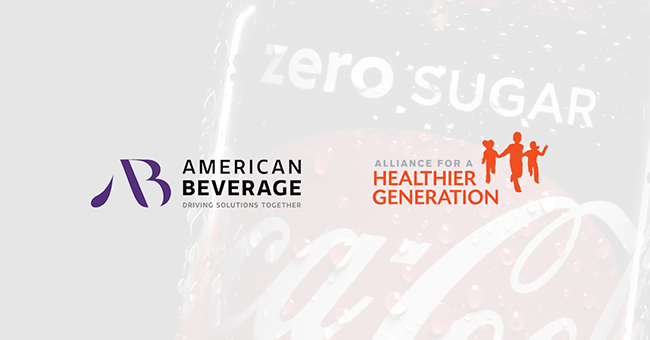“Don’t drink your calories” is a classic piece of health advice, and American consumers are increasingly following it as average overall calorie consumption from beverages has fallen 10% since 2014, according to a new progress report on the Beverage Calories Initiative (BCI).
BCI is an ongoing nationwide project — helmed by the Alliance for a Healthier Generation with participation from American Beverage Association, The Coca-Cola Company, Keurig Dr Pepper (KDP) and PepsiCo — with the goal of reducing per-person beverage calorie consumption by 20% between 2014 and 2025. This latest report, compiled by independent evaluator Keybridge LLC, found that the initiative officially reached the halfway point in 2020, with low and zero sugar beverage innovations helping drive sales trends away from sugary and high calorie drinks.
“America’s beverage companies are introducing more choices with less sugar and smaller portion sizes than ever before – and today nearly 60% of all beverages purchased by consumers are zero or low sugar,” said American Beverage president and CEO Katherine Lugar in a press release. “These results show the power of public-private partnerships working together to help support consumers’ efforts to balance their lives.”
According to the report, per person beverage calorie consumption fell 5% in 2020, the largest single year drop since BCI began and the fourth year in a row where intake fell.
The shift towards lower calorie drinks accelerated during the pandemic, the report stated: as on-premise consumption in bars, restaurants, vending machines and entertainment venues fell, consumers pivoted towards healthier options. However, the move to at-home consumption led to an increase in calorie intake from products purchased in retail (up 6.1 calories per person per day), while intake levels at on-premise accounts fell drastically (-15.7 calories per person per day).
The decline is also reflected in changing category volume sales, the report noted. Since 2014, carbonated soft drinks have fallen from the largest share of total beverage volume (40.8%) to second place (33.3%), while water volume — including still and sparkling drinks — grew nine points from 35.6% to 44.8%. Juice sales during the period fell from 10.7% share to 8.4% share.
Overall, low and no-calorie beverages grew from 50.1% of volume share in 2014 to 58.7% in 2020. Although leading strategics have increasingly focused on launching “Zero Sugar” versions of their core soda brands, diet CSDs also lost share, down from 11.3% to 9% in the period. Meanwhile, “other” low cal products, which groups RTD coffee, enhanced water and energy drinks, increased their volume share from 3.2% to 5%.
In addition to changing consumer preferences, product innovation has also played an important role in bringing down beverage calorie intake. The average amount of calories per 8 oz. serving fell from 47.5 in 2014 to 39.3 in 2020, the report stated. Between 2016 and 2020, total calories per serving fell 13.5%.
Split by category, energy drinks saw the biggest drop in calorie levels during the period, falling 18.8%, followed by sports drinks (down 16.2%) and RTD coffee (down 7.6%). The decline in calorie content has coincided with rising sales for these categories, the report noted. The shift has also had a significant impact on market share within each category, with low and no calorie energy drinks rising from 20.4% of the category in 2017 to 36.5% in 2020.
While CSDs reported a smaller change, with low and no calorie options rising just 1.7 points to 27.1% of the category share in 2020, the report noted that “the impact of this change in calories per person is major due to the category’s relative size.”
Much of the trend has already been witnessed in not just innovation, but also M&A activity, as strategics have moved to discontinue or divest in sugary juice brands and bring in more better-for-you options. Coke previously passed over an opportunity to acquire Suja before dropping (and later selling) Odwalla, while PepsiCo divested Naked and Tropicana earlier this year. Meanwhile, large companies have eyed the water category, including Nestlé’s March acquisition of Essentia and Molson Coors Beverage Company taking a minority stake in ZenWTR. Coke, meanwhile, has continued to invest in growing sparkling water brand Topo Chico, which it acquired in 2017.
